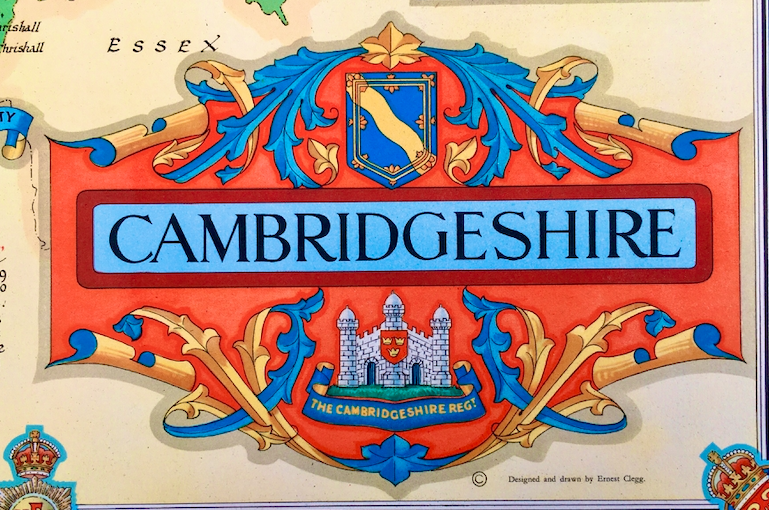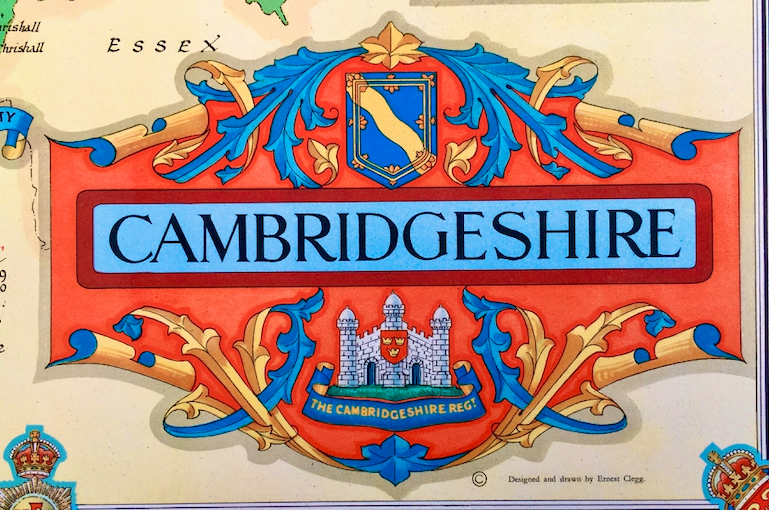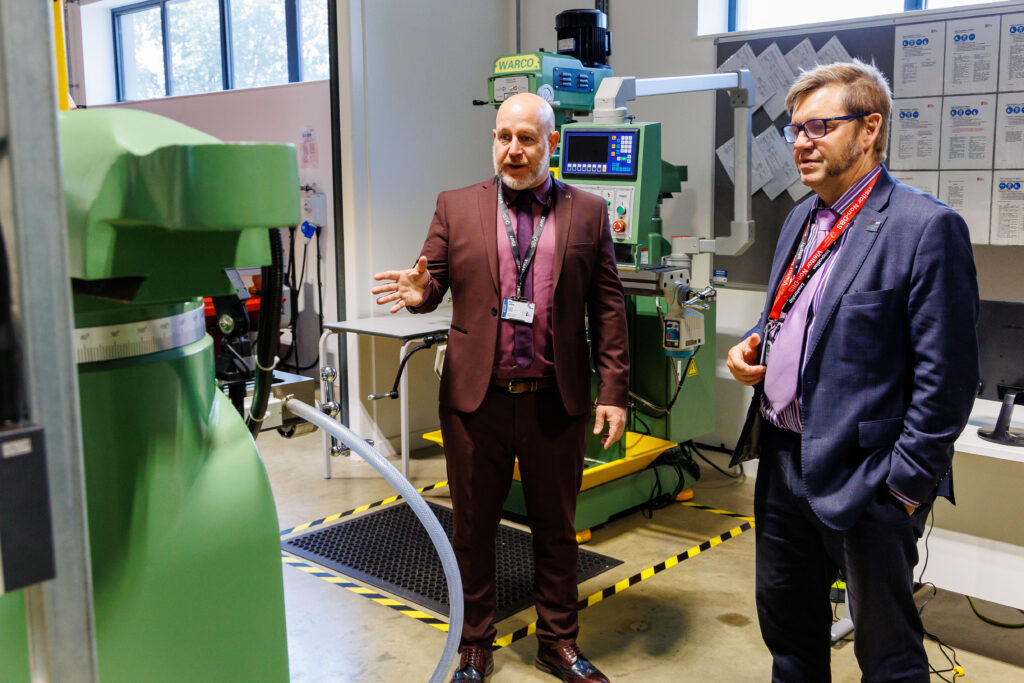
Still no deal with controversial property firm regarding the Castle Hill site on which once stood the county gaol
Some of you may have picked this up from the County Council’s Strategy and Resources meeting papers. It’s the bit at the end following the *You can’t see this bit!* notice in today’s agenda at item 10. John Elworthy and friends reported on it in the Cambs News – you can read what he wrote here.
Above – Cambs News on Twitter, which covers the northern half of our county.
A long story summarised
The issues around this go back a very long way – almost 20 years. In a nutshell the firm involved with renovating the Shire Hall building is the same one involved in the controversial redevelopment of Cambridge Railway Station.
I only started taking notice of what was happening when it was too late. The main controversies pre-date social media being mainstream. Not that this has stopped the phenomenon of big developers making fortunes while local councils are run on shoestring budgets at the behest of incompetent ministers.
Everyone knew the railway station area needed an overhaul. It was Richard Rogers and friends who were originally commissioned to design the master plan by a property company called Ashwells.

Above – by RSHP – Cambridge Station proposals
But then the firm went into administration in not-quite-clear circumstances and re-emerged as Brookgate. Then all of the civic features seemed to disappear.
“A planned health clinic, along with a new home for the county’s archive and a heritage visitor centre, have all failed to materialise. “All the public benefits of the project have been progressively eaten away,””
It’s worth reading Mr Wainwright’s article to get the background story. Richard Taylor, who we don’t see much of these days, was the most prominent blogger and critic of what was happening in Cambridge local government in the late 2000s/early 2010s, and he wrote about what was happening at the time. This was when the Cambridge Liberal Democrats were at the height of their local political power (See the table here from Messrs Edkins & Rosenstiel).
The decline of the Cambridge Liberal Democrats on the city council in the 2010s is something worthy of a research study – as was their rise in the 1990s which saw off the once mighty Cambridge Conservative Association as a political force in our city.
Brookgate have, financially been a very successful company – which makes it all the more painful that Cambridge Railway Station never got the original civic facilities such as the County Archives – which are now (for me at least) in an inaccessible place from Cambridge: The city of Ely. Cambridge, the greatest small city in the world, but cannot find a home for its archives within its borders. Nice return on the investment for Brookgate’s shareholders though. See their filings with Companies House here.

Above – some headlines from Brookgate’s 2021 returns froM Companies House.
Yet if it wasn’t Brookgate doing this, it would be someone else. Pace Investments bludgeoned the local community with its proposals for the land around The Flying Pig Pub (which had been around since…1840) and eventually overturned the City Council’s refusal with an appeal to a Planning Inspector. The City Council was left with the appeal costs, while the investment firm sold the site with its gleaming new planning permission to RailPEN the railway workers’ pension fund, and banked the profit from the planning uplift land value. Again, this is just another example of why the system under the Conservatives destroys people’s faith in the planning system and in politics generally. This is not helped by the huge donations made by developers and the construction industry generally to the Conservative Party. How we fund our democratic and political institutions is something that remains in the ‘too difficult to deal with pile. As does the financing of local government which MPs have also said is unsustainable. Despite the report and its recommendations, the Government confirmed overhauling local government finance would stay in the ‘too difficult to deal with’ pile in its response in October 2021.
“What is to be done?!”
‘Turn it into a museum!’
This has been one of my pet projects/issues for years – extending the Museum of Cambridge onto the Castle Hill site which is pretty much where Cambridge the town was established. Back in 2016 after the catastrophic EU Referendum result, I took myself up to the top of Castle Mound and started filming what became a series of short video clips on the history of Cambridge the town. Anything to get me away from national and party politics!
You can see the playlist of videos here.
In May 2019, the then Conservative-Controlled Cambridgeshire County Council then announced it was moving the council out of Cambridge and to a site at Alconbury.
Which now leaves us with the greatest small city in the world that cannot take decisions on streets, parking, and libraries in its own city but has to go out to Alconbury on the other side of Huntingdon, while its archives are in Ely.
I first wrote about the proposals from the County Council Conservatives a month before – at which point the then Leader of the Council, Cllr Steve Count (now Leader of the Opposition) clarified that the Council’s preference was for a long term lease.
Given that I saw no way of persuading the now former administration of changing their mind, I made the case for restoring the old Assizes Courthouse (pictured below from the Museum of Cambridge) with an extension to the old design to create a new facility for the Museum on an area of land that was turned into a car park.

Above – the old Assizes Court House on Castle Hill
What I didn’t see coming was the massive party political changes at the top of local government institutions in Cambridgeshire that followed over the next few years

Above – quoting John Elworthy, then Editor of the Ely Standard, in my blogpost covering the announcement of Brookgate becoming the preferred bidder for renovating the Shire Hall site in 2019.
At the time the situation was:
- Mayor James Palmer (Cons) chairing the Combined Authority, with an adversarial working relationship with his Labour and Liberal Democrat opponents, the Leader of Cambridge City Council (Lewis Herbert) and South Cambridgeshire District Council (Cllr Bridget Smith) respectively.
- Mayor Palmer running the Combined Authority having stated prior to his election that he would not not work with County Council transport officers (my issues with the latter being the subject of a long blogpost somewhere else!)
- Mayor Palmer having an adversarial working relationship with the Greater Cambridge Partnership, whose board had representatives of each of the main political parties (Cons – Cambs CC, Lib Dems – South Cambs DC, and Labour – Cambridge City).
- Mayor Palmer trying to bring through his proposals for a metro for Cambridge – one using untried rail-less technology (which I thought was a bad idea) and involved constructing two tunnels underneath Cambridge city centre (which I thought was a splendid idea).
Then the Pandemic arrived (it’s still here) and the first lockdown hit – resulting in postponed elections for 2020. In 2021 the ‘super-elections’ resulted in Mayor Palmer losing the mayoral elections to his Labour opponent Dr Nik Johnson, a medical doctor based at Hinchinbrooke in Huntingdonshire.
The additional preference voting system meant that many of those that had voted Liberal Democrats opted to transfer their. vote to Labour after the first round, resulting in Dr Nik Johnson’s victory. Furthermore, this also happened to be when Cambridge City Council had a full council election for *all councillors* due to new boundaries, and a full election for Cambridgeshire County Council.
That plus the failings of Central Government over Brexit and the pandemic response meant the net result was a much higher turnout in the south of the county than in the north.
Fast forward to 2022 and South Cambridgeshire returned the Liberal Democrats with an even bigger majority than in 2018 in what was meant to be a safe-as-castles Tory council, while the even safer military fortress of Huntingdonshire District collapsed to a new joint administration of Liberal Democrats, Independents, Labour, and Green councillors – putting the Conservatives in opposition for the first time in that council’s modern history (i.e. 1974).
Not that any of this improved things. The Combined Authority – already having issues with relationships between mayors and permanent staff, was issued with a formal notice from Ministers yesterday. I stated that it came as no surprise given events over the previous 18 months. This also came in the face of the debate yesterday about the proposed use of the Mayoral Precept to maintain bus services cut by Stagecoach.
So you could say that politics – locally and nationally, is all over the place at the moment!
“Does it mean we’ll get our Shire Hall back?”
No.
Not unless we can somehow raise the money to cover the costs that the County Council needs to meet in order to make use of the building for whatever purpose people propose – heritage or otherwise. And that’s not going to happen under the present Government and culture in The Treasury. Here’s the Chief Executive of Cambridgeshire County Council (i.e. not a politician but the head of the permanent service of council officers) Stephen Moir.
In the grand scheme of things I don’t have a problem with the main building being a hotel. I quite like the idea of it being a boutique heritage-themed hotel.
At the time I suggested building some new castle-themed buildings on some of the spare land, renting it out as office space, having a rooftop tower cafe with splendid views and an expensive menu to match (to subsidise the Museum), and having a second ‘city centre’ light rail underground stop and designate that as the start of the ‘tourist trail’ so people can walk down the hill from there, past/popping into the Museum of Cambridge en route to The Backs or King’s Parade.
I also suggested turning the current set of offices into a new Cambridge Legal Quarter with Crown, County, and Magistrates Courts all on site (as was proposed in the 1950s and 1960s)
But as things stand, I can’t see any of the above happening. And even it it does, it won’t be within my lifetime. Hence pointing people to local campaigns including the recently-formed Cambridge Land Justice Campaign – one of the few active town and gown campaigns up-and-running that is led by students and young people. (Which makes it all the more important for us old people to support them *but not take over* – and in anycase their ideas for actions are far more exciting than anything I could ever come up with!)
Food for thought?
If you found this useful/interesting and are able to contribute towards my ongoing research into the history, current events, and the future plans for Cambridge, please consider a small donation at https://ko-fi.com/antonycarpen.

























